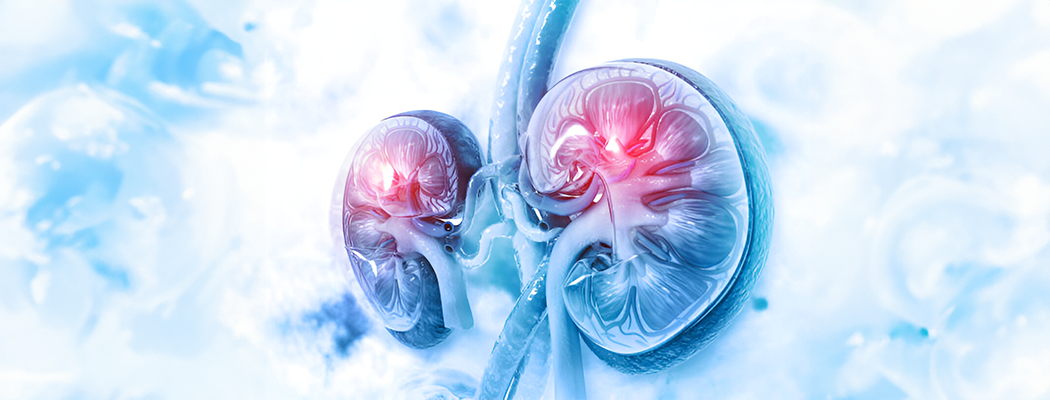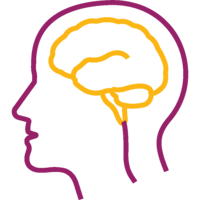
Wednesday, 27 November, 2024
A major medical condition that affects millions of people worldwide is kidney disease. It encompasses various conditions that affect the kidneys' capacity to function normally, which, if left untreated, might result in serious consequences. But, what is kidney disease? In simple terms, it refers to any condition that impairs kidney function and may make it more difficult for the kidneys to adequately filter waste and extra fluid from the blood. Today we will delve into different types of kidney disease, their symptoms, causes, treatments, and preventive measures. By understanding kidney health better, individuals can take proactive steps to protect themselves from potential kidney damage.
Types of Kidney Disease
Understanding types of kidney disease is important for recognizing symptoms and seeking appropriate treatment. Below are some of the most common types
Chronic Kidney Disease (CKD)
Understanding what is Chronic Kidney Disease (CKD)?
It is a long-term condition characterized by the gradual loss of kidney function. It is often asymptomatic in its early stages, which can make it difficult to detect until significant damage has occurred. The leading causes of CKD include:
- Diabetes: High blood sugar levels can damage the kidneys over time.
- Hypertension: Uncontrolled high blood pressure can harm kidney function, leading to CKD.
- Glomerulonephritis: This is inflammation of the kidney's filtering units and can contribute to kidney damage.
Kidney Stones
Now let's understand what is kidney stone disease?
These are solid masses formed from minerals and salts that crystallize in the kidneys. They can vary in size, from tiny grains to larger stones that can obstruct the urinary tract. Symptoms of kidney stones include severe pain in the back or side, blood in the urine, and frequent urination. Factors that contribute to kidney stone formation include:
- Dehydration: Not drinking enough fluids can lead to concentrated urine, increasing the risk of stones.
- Diet: High intake of oxalate-rich foods (like spinach) or excessive sodium can increase stone formation.
- Family History: A genetic predisposition can play a role in an individual’s likelihood of developing kidney stones.
Urinary Tract Infections (UTIs)
Urinary Tract Infections (UTIs) are infections that can affect any part of the urinary system, including the kidneys. UTIs are typically caused by bacteria entering the urinary tract, leading to symptoms such as burning during urination, frequent urination, and lower abdominal pain. If untreated, a UTI can ascend to the kidneys and cause pyelonephritis, a more serious infection.
Preventing UTIs involves maintaining good hygiene, staying hydrated, and urinating after sexual activity to flush out bacteria. Treatment usually involves antibiotics, and it’s crucial to complete the entire course as prescribed.
Polycystic Kidney Disease (PKD)
Polycystic Kidney Disease (PKD) is a genetic disorder characterized by the growth of numerous cysts in the kidneys. These cysts can gradually enlarge the kidneys and impair their function over time, potentially leading to kidney failure. There are two main forms of PKD:
- Autosomal Dominant PKD (ADPKD): This form typically manifests in adulthood and is often caused by a mutation in the PKD1 or PKD2 gene.
- Autosomal Recessive PKD (ARPKD): This rare form usually appears in infancy or early childhood and can result in severe complications.
Symptoms of PKD may include high blood pressure, back or side pain, and frequent urinary tract infections. Although there is no cure, management focuses on controlling symptoms and complications, including blood pressure and pain management.
Glomerulonephritis
Glomerulonephritis refers to a group of conditions that cause inflammation of the glomeruli, the tiny filtering units in the kidneys. This inflammation can impair the kidneys' ability to filter waste from the blood. Causes of glomerulonephritis include:
- Infections: Post-streptococcal glomerulonephritis can develop after a throat infection.
- Autoimmune diseases: Conditions like lupus can affect the kidneys.
- Vasculitis: Inflammation of the blood vessels can impact kidney function.
Symptoms of glomerulonephritis may include blood in the urine, foamy urine (indicating protein), swelling, and elevated blood pressure. Treatment often involves addressing the underlying cause, managing symptoms, and in some cases, immunosuppressive therapy.
How are Children and Young Adults Affected by Kidney Disease?
Kidney disease is not just an adult issue; children and young adults can also be affected. Pediatric kidney disease can arise from congenital anomalies, hereditary disorders, and acquired conditions. Some of the common issues include:
Congenital Anomalies
Congenital anomalies of the kidney and urinary tract (CAKUT) are present at birth and can affect kidney development and function. These abnormalities may include:
- Horseshoe Kidney: A condition where the kidneys are fused together at the lower end.
- Renal Agenesis: The absence of one or both kidneys.
Early diagnosis through prenatal ultrasounds or postnatal imaging can aid in managing these conditions effectively.
Hereditary Disorders
Genetic conditions like PKD can also manifest in childhood. Inherited forms of kidney disease may lead to complications if not monitored closely.
Acquired Conditions
Conditions such as urinary tract infections (UTIs) can occur in children, especially if there are anatomical issues or behavioral factors (like inadequate toilet habits). Early intervention is vital to prevent recurrent infections that may lead to kidney damage.
Psychological Impact
Beyond physical health, kidney disease can impact the emotional and psychological well-being of children and young adults. Chronic illness may lead to anxiety, depression, and issues related to social interactions. Support from healthcare providers, family, and peer groups is essential to help young patients cope with their condition.
Understanding the causes of kidney damage in adults is also crucial, as early intervention can help prevent progression and complications in both pediatric and adult populations.
What Causes Kidney Disease?
Several factors contribute to the development of kidney disease. Understanding these causes is crucial for prevention and management:
1. Diabetes
Diabetes is the leading cause of kidney disease worldwide. High blood sugar levels can damage the blood vessels in the kidneys, leading to diabetic nephropathy. Regular monitoring of blood glucose levels and adherence to treatment plans can help mitigate this risk.
2. Hypertension
Uncontrolled high blood pressure can cause damage to the kidneys over time. The increased pressure can harm the delicate blood vessels in the kidneys, impairing their function. Blood pressure management is essential for kidney health.
3. Genetic Factors
Certain kidney diseases, such as PKD and Alport syndrome, can run in families. Understanding your family history can help assess your risk for hereditary conditions.
4. Obesity
Obesity is a significant risk factor for both diabetes and hypertension, making it a contributor to kidney disease. Maintaining a healthy weight through diet and exercise is crucial for overall health.
5. Medications and Toxins
Prolonged use of certain medications, particularly nonsteroidal anti-inflammatory drugs (NSAIDs) and certain antibiotics, can lead to kidney damage. Additionally, exposure to environmental toxins or heavy metals can also harm kidney function.
6. Infections
Infections such as pyelonephritis can damage the kidneys if not treated promptly. Recurrent urinary tract infections can also lead to scarring and dysfunction in the kidneys.
7. Dehydration
Chronic dehydration can lead to kidney damage as the kidneys require adequate fluid intake to function optimally. It's essential to stay hydrated, especially in hot climates or during intense physical activity.
Understanding these causes can empower individuals to make lifestyle changes and seek early intervention when necessary. Consulting nephrologists in Bangalore can provide valuable guidance and support for managing kidney health effectively.
Symptoms of Kidney Diseases
Recognizing the kidney disease symptoms is crucial for early detection and treatment. Here are some common signs and symptoms:
1. Fatigue and Weakness
Kidney dysfunction can lead to the accumulation of waste products in the bloodstream, causing fatigue and weakness. Anemia, which is common in individuals with kidney disease, can also contribute to feelings of tiredness.
2. Swelling
Fluid retention due to impaired kidney function can lead to swelling in the legs, ankles, and feet. This is often a sign that the kidneys are not effectively removing excess fluid from the body.
3. Changes in Urine Output
Alterations in urine output, such as decreased urination or dark-colored urine, can indicate kidney problems. Foamy urine may suggest protein in the urine, a condition known as proteinuria.
4. High Blood Pressure
Kidney disease can lead to high blood pressure due to fluid overload and hormonal changes. Conversely, uncontrolled hypertension can exacerbate kidney damage.
5. Persistent Back Pain
Pain in the lower back or side can be a symptom of kidney stones or infections. If accompanied by other symptoms, it may indicate a more serious condition.
6. Nausea and Vomiting
The buildup of waste products can lead to gastrointestinal symptoms, including nausea and vomiting. This may also occur as a side effect of certain treatments.
7. Changes in Appetite
Individuals with kidney disease may experience a reduced appetite or aversions to certain foods, particularly those high in protein. This can lead to nutritional deficiencies and weight loss.
8. Itchy Skin
Waste accumulation can cause skin irritation and itching. This symptom can significantly impact quality of life, leading to discomfort and sleep disturbances.
If you experience any of these symptoms, especially in combination, it is essential to consult a healthcare professional for further evaluation and potential testing.
What is the Treatment for Kidney Disease?
The treatment approach for kidney disease varies depending on the type and stage of the condition. Here are some common treatment options:
Lifestyle Changes
Adopting a healthy lifestyle can significantly impact kidney health. Key lifestyle changes include:
- Dietary Modifications: Following a kidney-friendly diet, which is low in sodium, phosphorus, and protein, can help reduce the burden on the kidneys. This includes incorporating more fruits, vegetables, and whole grains while limiting processed foods.
- Regular Exercise: Engaging in regular physical activity can help control weight, blood pressure, and blood sugar levels, promoting overall health and enhancing kidney function.
- Hydration: Staying well-hydrated supports kidney function. Drinking adequate amounts of water is essential for flushing out toxins and preventing dehydration.
Medications
Medications may be prescribed to manage underlying conditions and alleviate symptoms associated with kidney disease. Common medications include:
- Antihypertensives: These medications help control high blood pressure, which is crucial for protecting kidney function.
- Diuretics: These drugs assist in reducing fluid retention and managing blood pressure by increasing urine output.
- Erythropoietin-stimulating agents: For patients experiencing anemia due to kidney disease, these medications can stimulate red blood cell production.
Dialysis
For individuals with end-stage kidney disease or kidney failure, dialysis may be necessary. There are two main types of dialysis:
- Hemodialysis: In this process, blood is filtered through a machine that removes waste and excess fluid before returning it to the body. Typically, this treatment occurs three times a week in a dialysis center.
- Peritoneal Dialysis: This method uses the lining of the abdomen to filter blood. A special solution is introduced into the abdominal cavity, where it absorbs waste products before being drained out.
Understanding the life expectancy of dialysis is an important aspect for patients and their families as they plan for treatment and overall quality of life.
Palliative Care
Palliative care focuses on improving the quality of life for individuals with advanced kidney disease. This approach encompasses:
- Symptom Management: Addressing symptoms such as pain, nausea, and fatigue to enhance comfort.
- Emotional and Psychological Support: Providing counseling and support services to help patients cope with the emotional aspects of living with kidney disease.
- Care Coordination: Ensuring comprehensive care by collaborating with various healthcare providers to meet the patient’s needs.
How to Prevent Kidney Disease?
While not all kidney diseases are preventable, certain lifestyle choices can significantly reduce the risk. Here are some preventive measures:
Control Blood Pressure
Maintaining healthy blood pressure is crucial for kidney health. High blood pressure can damage the blood vessels in the kidneys, impairing their ability to filter waste. Regular monitoring and management through lifestyle changes or medications can help keep blood pressure within a healthy range.
Manage Blood Sugar
For individuals with diabetes or prediabetes, controlling blood sugar levels is essential to prevent kidney damage. Monitoring blood glucose, following a diabetic diet, and adhering to prescribed medications can help maintain optimal blood sugar levels, thereby protecting kidney function.
Eat a Kidney-Friendly Diet
A balanced diet is vital for kidney health. Focus on incorporating fruits, vegetables, whole grains, and lean proteins into your meals while reducing sodium and processed foods. Limiting foods high in phosphorus and potassium is also important for individuals at risk for kidney disease.
Maintain a Healthy Weight
Achieving and maintaining a healthy weight can reduce the risk of developing conditions that contribute to kidney disease, such as hypertension and diabetes. Regular physical activity and a balanced diet are key to managing weight effectively.
Conclusion
Kidney disease is a serious condition that requires attention and management. Understanding the different types of kidney disease, including the growing concern of chronic kidney disease in young adults, their causes, symptoms, and treatment options is essential for early detection and effective management. By adopting a healthy lifestyle, monitoring risk factors, and seeking regular medical check-ups, individuals can take significant steps toward protecting their kidney health.
Remember, if you experience any symptoms or have concerns about your kidney health, consult a doctor for guidance and support. Early intervention can make a crucial difference in the management of kidney disease and overall quality of life. For expert care, visit the best kidney hospital hospital in Bangalore to receive comprehensive treatment and personalized support for your kidney health needs.
FAQ’s
Can kidney disease be cured?
No, there is no cure for chronic kidney disease (CKD), but treatments can help manage symptoms and slow its progression. Treatments depend on the stage of the disease.
What is the best treatment for kidney disease?
Treatment for kidney disease depends on the stage of the disease and the patient's needs i.e Lifestyle changes, Medications, Dialysis, Kidney transplant, Conservative management
What foods help repair kidneys?
Several foods can help with kidney health which includes fruits, vegetables, proteins, carbohydrates, drinks, olive oil
How do I know if my kidney is healthy?
There are a few ways to check if your kidneys are healthy, including Urine albumin-creatinine ratio (uACR) test, Blood test, Imaging tests, Kidney biopsy
Consultant Nephrology
MBBS, MD, DNB


 Neurosciences
Neurosciences Bariatric Surgery
Bariatric Surgery